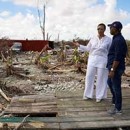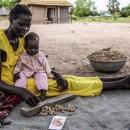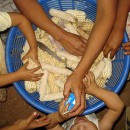Friday, June 9, 2023
News and Views from the Global South
Health

It’s Time to Ban Cigarette Filters
The second session of the Intergovernmental Negotiating Committee on plastic pollution (INC-2), held in Paris, France, from May 29 to June 02, 2023, concluded with optimism and the prospect of ending plastics pollution. Over 700 delegates from 169 Member States agreed to prepare a zero draft of agreement ahead of the third session in November this year.
The U.S. Assault on Mexico’s Food Sovereignty
On June 2, the U.S. government escalated its conflict with Mexico over that country’s restrictions on genetically modified corn, initiating the formal dispute-resolution process under the U.S.-Mexico-Canada Agreement (USMCA).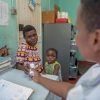
Close Inequalities to End AIDS & Prepare for Future Pandemics
The COVID-19 crisis has shone a light on the danger of pandemics; social crises have shone a light on the danger of inequalities. And the reality is that outbreaks become the pandemics they do because of inequality. The good news is that both can be overcome – if they are confronted as one.
Of the Sahel and the Merchants of Death
There is a tangled trafficking web that has been woven across the Sahel, which spans almost 6.000 kilometres from the Atlantic Ocean to the Red Sea, and is home to more than 300 million people in 10 countries: Burkina Faso, Cameroon, Chad, The Gambia, Guinea, Mali, Mauritania, Niger, Nigeria, and Senegal.
What Sub-Saharan African Nations Can Teach the U.S. About Black Maternal Health
New research shows that Black mothers in the United States disproportionately live in counties with higher maternal vulnerability and face greater risk of preterm death for the fetus, greater risk of low birth weight for a baby, and a higher number of maternal deaths.
US Ban on Smoking Undermined by Tobacco Industry
The US has some of the strictest laws against smoking in public, including a 1997 executive order which bans smoking in all government federal buildings. But still, the tobacco industry and its allies do not rest, says Dr. Jarbas Barbosa, Director of the Washington-based Pan American Health Organization (PAHO).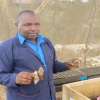
Kenyan Scientist’s Trend-Setting Research into Health Benefits of Snails
Snails and slime are usually followed by the thought ‘EEW!’ from most people … some might even scream at seeing a snail near them. For Dr Paul Kinoti, however, these slimy creatures could earn him international recognition because his research on snails landed his institution, Jomo Kenyatta University of Agriculture and Technology (JKUAT), a Ksh. 127 million (USD 1 million) grant.[related_articles]
Menstrual Health and Hygiene Is Unaffordable for Poor Girls and Women in Latin America
Menstrual hygiene management is elusive for millions of poor women and girls in Latin America, who suffer because their living conditions make it difficult or impossible for them to access resources and services that could make menstruation a simple normal part of life.
The Lead-Free Water Pledge: Steps Towards a Future of Lead-Free Drinking Water
At the UN Water Conference in March 2023, the Water Institute at the University of North Carolina (UNC) along with several key partners, including UNICEF, Water Aid, the World Health Organization, and the governments of Ghana, Uganda, and South Africa, among others, organized a session centered around the elimination of lead in drinking water across the globe.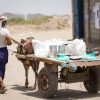
G7 Has Failed the Global South in Hiroshima
"G7 countries have failed the Global South here in Hiroshima. They failed to cancel debts, and they failed to find what is really required to end the huge increase in hunger worldwide. They can find untold billions to fight the war but can’t even provide half of what is needed by the UN for the most critical humanitarian crises."
Nothing Beats Bushmeat, Not Even the Risk of Disease
Meat from wild animals is relished across Africa and widely traded, but scientists are warning that eating bush meat is a potential health risk, especially in the wake of pandemics like COVID-19.
Education Must Be Put Front and Centre on the G7 Agenda
At this year’s G7 Hiroshima Summit in Japan, world leaders will have a chance to “uphold the international order based on the rule of law and extend outreach to the Global South.” Education, as a binding force that unites us all in our global efforts to protect human rights and ensure sustainable development, should be front and centre on the G7 Agenda.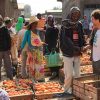
Why Quality Seeds Are among the Most Valuable Currency in Climate Finance for Africa
At long last, momentum is growing for an overdue rethink of climate finance and development assistance to support countries on the frontlines of the climate crisis.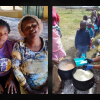
Finding Ways to Feed South Africa’s Vast Hungry Population
In the deep rural village of Jekezi in South Africa's Eastern Cape, most young and able-bodied people have fled the area, leaving behind people with disabilities, the elderly, and children.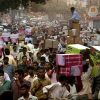
Population Growth is Not Good for People or the Planet
India’s population has just reached 1.4 billion people, surpassing China as the world’s most populous nation four years earlier than projected. Spurring this growth is a traditional patriarchal culture in which women’s identity is constrained by the social expectation they bear children.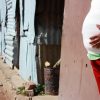
EXPLAINER — Maternal Mortality: Why Has Progress In Saving Women’s Lives Stalled?
A new report reveals that from 2000 to 2015, the global maternal mortality ratio (MMR) fell by 33%, and by more than 50% in 58 countries that had the highest rates of women dying during pregnancy or up to 42 days after delivery. But from 2016 to 2020, maternal mortality barely changed. In 2020, roughly 287,000 women globally died from a maternal cause, which is almost 800 maternal deaths daily, and about one every two minutes.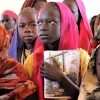
The Privilege of Making a Choice
A civilian student named Saber was caught in the crossfire in Khartoum. He had two choices: either flee and lose everything; or die. But within a moment his option to choose was violently denied: he died.
Statement on the G7 Hiroshima Summit, the Ukraine Crisis and “No First Use” of Nuclear Weapons
The Ukraine crisis, which in addition to bringing devastation to the people of that country has had severe impacts on a global scale—even giving rise to the specter of nuclear weapons use—has entered its second year. Against this backdrop and amid urgent calls for its resolution, the G7 Summit of leading industrial nations will be held in Hiroshima, Japan, from May 19 to 21.
New Mosquito Species Could Derail Fight Against Malaria
‘Urban’ Kenya has been alerted because new mosquito species, Anopheles stephensi, threatens to derail decades of effort made in the fight against malaria.
Can a Pledge to End TB Stick This Time Around?
This week, the United Nations will host two days (May 8-9) of preliminary talks to plan a larger conference on tuberculosis (TB) in September. These preliminary talks will be held in New York City, the epicenter of the last significant surge of TB cases in the United States (U.S.) thirty years ago.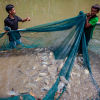
How the Rise of Timor-Leste’s Aquaculture Sector Is a Blueprint for Other Small Island Nations
For Timor-Leste, as with most other islands in the Pacific, fortunes are to be found in fish – an equity food available to all regardless of status.Next Page »


